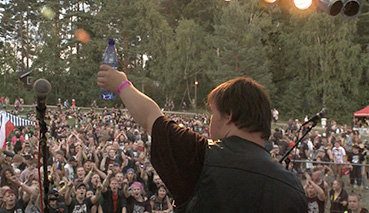| |
"The film tells about Pertti Kurikka's Name Day... so it's about one retard who sings punk and three retards who play punk. You should watch it and think about whether you should hate disabled people or love and respect them." |
| |
Pertti Kurikan Nimipäivät lead singer Kari Aalto |
It may be hawking a well-worn cliché, but I do believe that to fully appreciate the importance and impact of punk rock on the '70s British youth scene then you really had to be there. The Thatcher government was screwing us three ways from Sunday, and you only need to watch one of those BBC4 Sounds of the 70s shows that target the period just before the punk explosion to appreciate how depressing the contemporary music scene was. But this new sound didn't so much land with a bang as ooze into the Zeitgeist though stories and pictures in NME and eagerly exchanged cassette tapes recorded at small venue gigs, usually in London. It was raw and aggressive and the bands had thrillingly confrontational names like The Clash, The Damned, The Sex Pistols and The Stranglers.
As a largely directionless, anti-everything youth I remember reading about what had by then already been dubbed punk rock and cynically dismissing it, just to be contrary. Then I heard a song that snapped me out of my lethargy. It was One Chord Wonders by The Adverts, as neat an encapsulation of the punk ethic as you could find at the time. There was no prog-rock pissing about with the guitar here, which was instead thrashed as if being beaten to death by a furious psychotic. And the lyrics spoke not of love or broken relationships or any of that other meaningless twaddle, but of the band's own inability to play more than one chord:
I wonder how we'll answer when you say
We don't like you – go away
Come back when you've learned to play
It was almost as if someone had wired me up to the mains and thrown on the power switch. From that moment on, my hunger for this new music was almost insatiable. It was the perfect medicine for such grim political times, a musical shout from the gutter that seemed to encapsulate our collective anger and rejection of an establishment that we wanted not just to kick against but tear apart. It democratised music in a way few movements have been able to since – you didn't need sharp or sophisticated instrumental skills to be in a punk band, just access to a guitar, a little imagination and the energy to bang out a couple of chords for an hour at a stretch.

Of course, punk eventually hit the big time, and like just about everything else was swallowed up and destroyed by the monster of commercialism. But just for a short period its was a musically thrilling time to be young and alive. And while The Adverts eventually found chart success with the lyrically disturbing Gary Gilmore's Eyes, they remained, like many of the more exciting pub bands, rather proud of their status as unsophisticated musicians. When I saw them live in 1977 they were teamed with The Damned on a tour that had what remains the best punk rock tag line I've seen: "The Damned can now play three chords. The Adverts can play one. Hear all four of them at..." How could you not respond to that?*
It was thus with a strong whiff of nostalgia that I first listened to modern day Finnish punk band Pertti Kurikan Nimipäivät, or as it translates into English, Pertti Kurikka's Name Day. Like those early pub bands, they thrash out their chords, pound away at the drums and snarl into the mic as if the last 38 years had simply not happened. There's an age range here that you would never have found in a 70s band, and of the four who make up the group – singer Kari Aalto, lead guitarist Pertti Kurikka, bassist Sami Helle and drummer Toni Välitalo – only Pertti is anything like as scrawny as seemingly malnourished predecessors. Of course, there's one other thing that distinguishes the band, that makes it worth of documentary portrait: all four members are adults with pronounced learning difficulties.
Aside from a quartet of introductory name captions, The Punk Syndrome [Kovasikajuttu] is an observational documentary in a style that would once have been instantly classified as vérité, a term modern documentary pioneer Frederick Wiseman memorably dismissed as "a pretentious and meaningless French word." He may have a point, as despite translating as "truth", vérité documentaries are as subject to editorialising as even the most structured reportage films, and are thus every bit as open to criticism for what the filmmakers choose to include or leave out. But vérité, like its American equivalent, Direct Cinema, is a recognised documentary sub-genre with its own codes and conventions, and here the label fits, with events observed and recorded and the final film edited from the material gleaned, the story unfolding without the assistance of voice-over or captions. This does leave the audience with the job of working out just who some of the supporting players are, a task made easier by the context in which they interact with the band.

In some respects, this is a familiar story of a basement rock band struggling to establish itself that builds a small cult following, goes on tour, lands a longed-for record deal, and finally gets to play to a big concert crowd. The key difference here is one of scale – even on their German tour the four musicians play small venues, their first single is independently produced (and on vinyl), and the climactic open air concert, though their biggest gig yet, is not exactly Glastonbury. But their achievement is still significant for four guys who not so long ago would have been ostracised from so-called regular society, and in some countries (dare I suggest ours?) still would be. They are also a testament to the democratic nature of a musical style accessible to just about anyone willing to give it a go, one whose straightforward riffs seem easier for Pertti to remember and play than the almost herculean daily task of writing his diary. Having said that, Down's syndrome drummer Toni never misses a beat, and on the evidence here could likely hold his own in any aspiring rock bank of note.
As you would expect of any vérité documentary worth its salt, the film's main focus is not the performance skills of the band – although this is well covered – but the personalities and lives of the four individuals who comprise it. In some respects it plays to rockumentary convention, notably in the very vocal falling out between Kari and Sami and Sami's subsequent threats to quit, but the unique nature of this particular musical quartet ensures that nothing plays quite to the genre norm. Kari's anger at Sami is not rooted in anything specific that Sami has done or said, but the sometimes hair-trigger mood swings of Kari's autism and his frustration at the restrictions imposed on his life by the community home in which he resides. The band members' disabilities also affect their world view and impact their relationships with members of the opposite sex, with Kari preparing for a future with his girlfriend Sirkka by pestering Sami for information on how babies are made, something the middle-aged Pertti – at his birthday party no less – proudly announces that he now understands. Toni, conversely, faces romantic disappointment when the girl he has fallen for reveals that she has now hooked up with the boy who lives across the hall in her communal home.
Other snippets of their individual home lives are touched on rather than explored in any detail, but a lot is inferred through savvy editing, with Sami's support for Centre Party leader Mari Kiviniemi and his deep disappointment at her poor electoral performance compactly communicated though a handful of well chosen shots. Occasionally, such economy is employed to comic but still telling effect, as in the cut to Kari having a reflective smoke after watching a video that outlines what sex is all about, or the image of Toni practising his drumming in his bedroom that cuts to a shot of his parents pottering about the house wearing ear protectors, which simultaneously suggests a key motivation for their gentle encouragement for him to finally move out.

The film certainly scores as a prejudice buster, with all four band members shown to be leading independent lives and coping well with everyday problems, despite Pertti's almost pathological obsession with clothing seams and the fact that Kari and Sami live in a communal home. Their music is clearly a crucial aspect of this, and also provides a window into experiences and frustrations that the film, for all its many virtues, leaves largely unexplored. The lyrics may be crude (suffering further in translation, where all of their rhyme and possible poetry is lost), but the shouts of protest, though a little ragged – Kari has suggested that the songs take only a couple of minutes to write – still come through intact.
Formally, the film breaks little new ground and tends to touch on areas that you can't help thinking need more probing investigation. But that may be the job of another film, and in the manner of any worthwhile vérité documentary, The Punk Syndrome says more through what it observes and implies than what it openly states. It's an emotionally involving approach made possible only by the cooperation and open honesty of its quietly inspiring lead players, as mismatched and yet somehow harmonious a musical quartet as you'll find anywhere in modern rock, and frankly a whole lot more likeable than most.
If you warm to the boys and their music – and I certainly did – then it's worth noting that they are about to embark on an international tour that includes five October concerts in the UK, which are listed here: https://www.songkick.com/artists/2786706-pertti-kurikan-nimipaivat.
Framed 1.78:1 and anamorphically enhanced, the film was shot on what I suspect was HD video in available light and generally looks fine on it, displaying a very decent contrast range, a good level of detail and no major digital issues when the light level drops. The colour is as natural as the source lighting allows and the live performance material looks pretty damned good, whatever the lighting conditions.

You can choose between Dolby 2.0 stereo and Dolby 5.1 surround soundtracks and for once the stereo is the superior of the two and very likely the original mix – the surround track is quieter, and despite the odd rather random bass boost it often sounds a little like someone has stuffed their socks in your speakers.
The English subtitles are burned in and a weeny bit Americanised, with an overuse of the seemingly ubiquitous word "awesome" when things go well.
I'm always a little miffed when I select the DVD Extras button and find only a sprinkling of trailers for other titles by the disc's distributor, but at least the trailer for this film is one of them. More background on the band would have been nice, but you can find a little some info on the film's home page here: http://kovasikajuttu.fi/en/
A revealing and consistently engaging fly-on-the-wall rockumentary with a crucial difference, one that makes it a fine ambassador for understanding and equality, particularly important at a time when disability hate crime has risen a record high in the UK.** A very worthwhile and enjoyable film that demands to be seen, and while the disc may be shy of extra features, the transfer is solid. For the film and the band and the underlying message, this definitely comes recommended.
* You can see the original poster here: http://www.southendpunk.com/html/damnadv.html
** This has been attributed to a depressing combination of the government's obscene "war on scroungers" propaganda and a dumbed-down populace who seem all too ready to swallow any crap thrown at them by the tabloid press, all of which makes it easy to warm to the band's musical dislike for those in parliament.
|